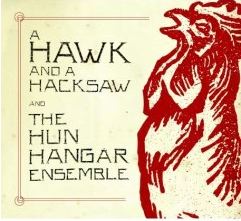 This gorgeous package from the the Leaf Label contains eight songs showcasing a new collaboration between Jeremy and Heather of AHAAH, playing with a group of seasoned Hungarian musicians. Rounding out the cast are a few members of Beirut. What results is a brief but exhilarating extra-geographical jaunt through Hungarian, Serbian, Romanian and klezmer forms, as only AHAAH can produce.
This gorgeous package from the the Leaf Label contains eight songs showcasing a new collaboration between Jeremy and Heather of AHAAH, playing with a group of seasoned Hungarian musicians. Rounding out the cast are a few members of Beirut. What results is a brief but exhilarating extra-geographical jaunt through Hungarian, Serbian, Romanian and klezmer forms, as only AHAAH can produce.At the inception of this project four years ago, one might have been justified to accuse Jeremy Barnes of a cynical kind of musical exoticization, borrowing heavily from Eastern European folk forms as a readymade repository of the surreal and evocative. For a musician who was previously best known for playing on willfully eccentric Neutral Milk Hotel and Bablicon albums, the criticism might have seemed to have some basis in reality. However, four years and several albums down the line, it is becoming much more difficult to level the accusation of audio tourism against A Hawk and a Hacksaw. Barnes, Trost, and co. have so doggedly pursued their particular soundworld that it is now impossible to see their elaboration and exploration of Slavic, Jewish, and Magyar musics as anything other than completely genuine. As the music becomes less about unorthodox cultural hybrids and more focused on faithful, spirited performances of these various cultural strands, it also loses any associations it might have once had with indie dilettantism.
I am noting all of this up front because this EP on the Leaf Label contains some of AHAAH's best recordings yet, and even though it is relatively short, it contains such a wide breadth of musical styles and moods that it might be accused of wanton eclecticism. This is very far from the case, however. Instead, this newly-extended musical collective uses their extensive knowledge of various folk musics to produce a breathlessly exciting and beautiful mini-album that is perfectly sequenced, weaving together original compositions with vigorous performances of traditional melodies. Opening with Heather Trost's composition "Kiraly Siratas," dominated by swoops of violin and the haunting tones of the cymbalom (a Hungarian dulcimer-like instrument), the atmosphere is established: joyfully dramatic, undeniably cinematic, unashamedly romantic.
"Zozobra" is the most energetic track on the EP, a fast-tempo slapstick combination of expertly played cymbalom, accordion and percussion. I've never been a dancer, but I found it difficult to resist the urge to jump out of my chair and manfiest bodily the joyful uptempo polyrhythms. "Serbian Cocek" is an ensemble piece, combining the full compositional abilities of all the musicians. Parallels will no doubt be drawn to the music of Beirut, because of the Mariachi-by-way-of-Budapest trumpets. Even with the big-band setup, the track is emotionally expressive and even impressionistic at times, an effect of the imperfect, slightly off-kilter playing. All of the performances captured here sound like just that: performances. Real human beings playing instruments, rather than clinical, surgically-edited and overdubbed studio creations. "Romanian Hora and Bulgar" is actually a live recording, but the only way that it differs from the rest of the EP is the smattering of audience noise, which merely serves to intensify the energy and drama of the performance. "Ihabibi" elaborates upon a peculiarly Balkan understanding of Arabic music, and is one of the most dynamic and beautifully textured songs on the disc. The EP ends with a trio of traditional songs, an ensemble piece ("Oriental Hora") featuring the trumpet of Zach Condon, sandwiched between two sparser pieces: one a solo on cymbalom ("Vajdaszentivany"), and the other a showcase for the Hungarian bagpipes, expertly played by Bela Agoston.
This generous set also includes a DVD featuring a 20-minute documentary about AHAAH, splicing together clips of the group in the studio and during live performances in Albequerque, in Hungary and all across the European continent. It's a very skillfully assembled set of clips that left me wanting more, but definitely clued me in to the intensity and intimacy of the AHAAH live experience, which previously I had only witnessed via the group's appearance on The Eye nearly two years ago. I have the feeling that the next full-length album from Barnes, Trost and co. is going to be a true masterpiece, if this stunning EP is any indication of the exponential growth-rate of this unique group.
samples:
Read More

